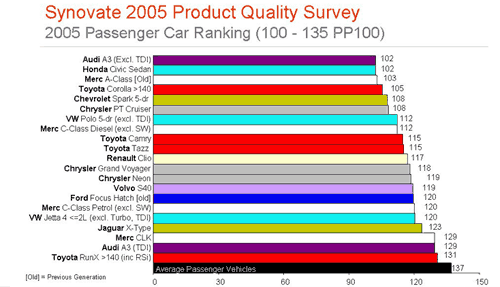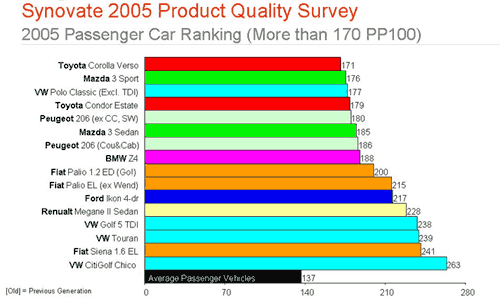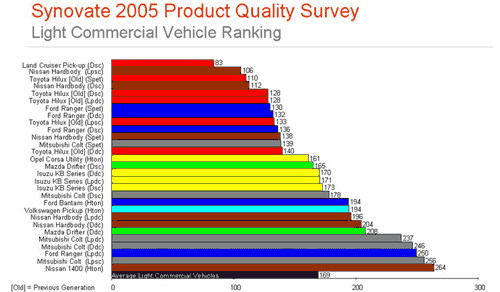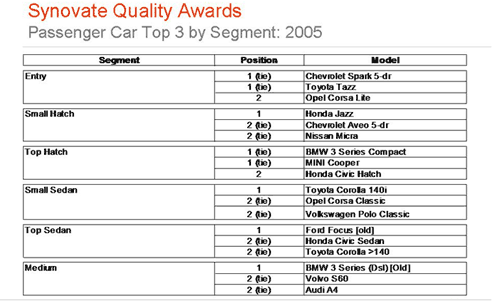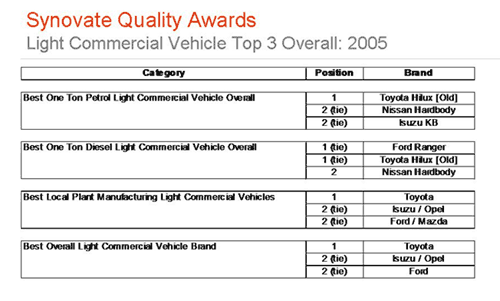These results form part of Synovate's Competitive Customer Satisfaction Index (CCSI), and are based on interviews conducted with approximately 55 000 vehicle owners on an annual basis. Part of this survey includes a Product Quality measurement, which is commonly known as PP100 or Problems per 100 Vehicles. Quite literally this survey measures the number of problems new car owners experience with their vehicles in the first few months of ownership.
Synovate is one of the largest research companies in the world. The company employs over 400 people in South Africa and conducts the largest competitive customer satisfaction survey in the country's automotive market.
"The product quality research has been conducted for more than 10 years and the results are used extensively by local manufacturers to identify and correct product problems," said Albert McLean, Synovate's Chief Operating Officer for the Middle East and Africa. "It is therefore recognised as the benchmark survey of customer experiences with the quality of their vehicles in the South African automotive market."
Vehicle quality has improved by 45.6% since 1998 - last year it was 40%.

"Although there has been some jockeying for position in the passenger vehicle market, resulting in some slight shifts, the only really significant changes seen in 2005 were due to the inclusion of additional vehicle brands," said McLean.
In the Passenger and Light Commercial Vehicle segments, there was a fair amount of change, but overall, the brands that were strong contenders in 2004, remained so in 2005. Nevertheless, 'remaining' strong proved, in certain cases, not be enough as the newly included brands showed they were a force to be reckoned with, and that they have the quality product to support their fight for market share and loyal customers.
In the Local Plant stakes, BMW, Toyota and Mercedes-Benz are still delivering excellent quality, although Mercedes-Benz's position is marginally weaker - now sharing second position with Toyota, as opposed to claiming first place as it did in 2004.
"We believe that this is a positive outcome for many car buyers, as they clearly do not have to settle for second best in terms of quality just because a luxury car might be out of reach financially," said McLean. "BMW is definitely setting the standard - and a high one at that - in the local production arena."
Competition amongst the luxury brands shows no signs of weakening, as exceptional quality is a prerequisite amongst buyers in this segment. BMW has grabbed the lead from Mercedes-Benz, with Volvo's improvements paying dividends in 2005. Volvo now shares a place with Audi, and both marques are hot on the heels of BMW, vying for the coveted first place.
The quality of last year's three top-seeded volume producers was upheld in 2005 and very little change was monitored during the survey. However, just maintaining their score did not prove to be enough, as the newly-included Honda moved straight into a very strong top spot.
"Honda's premiere in the top position was well deserved, with fewer problems than their nearest rivals, Toyota," said McLean. "Opel and Ford both fell off the podium as Renault also proved to be a formidable rival, moving into third behind Toyota."
On a segment level, the changes also tended to be more pronounced in the volume segments:
Entry segment: The big selling Toyota Tazz and Opel Corsa both won Synovate quality awards this year. However, the Chevrolet Spark, included in this segment for the first time, roared into a tie with the Tazz for first place.
"As a returning brand, many in the market will have no past experience with or preconceived ideas about Chevrolet, and establishing a good image as far as quality will support the brand's development," said McLean.
Small Hatch: Change was quite dramatic in this segment, with none of the previous award winners still in the top three. The Ford Fiesta, Toyota RunX and Opel Corsa lost their podium spots, with the Honda Jazz a deserved winner with a very low problem count. The Chevrolet Aveo 5-dr and Nissan Micra 1.4 also entered the top three, tied for second position.
Top Hatch: The BMW 3-Series Compact remained the only constant in the Top Hatch segment as the Mercedes-Benz A-Class and Audi A3 TDi battled against the positive results produced by the much-improved MINI Cooper (tied with the BMW 3-Series Compact for first place) and the incoming Honda Civic Hatch (placed second).
Small Sedan: In contrast with the other segments, no change was reported for the small sedan segment. Toyota set the standard with the Corolla 140i, while the VW Polo Classic and Opel Corsa Classic battled each other and ended in joint second place.
Top Sedan: The bigger engined Toyota Corolla again maintained a top three position, but with slightly more problems, it could not match the quality of the Ford Focus (previous model). The newly included Honda Civic Sedan entered the ranking, thereby ousting the Chrysler Neon from the awards ranking.
According to McLean, competition in this segment was strong throughout the survey period, with a number of other models within reach of a podium position should any of the top models take their eyes off the ball during the next year. Given that this is the second time the PP100 results have been published in SA, it is interesting to note the degree of change.
Medium: The BMW 3-Series Diesel again produced a very low problem count, sufficient to propel it from second place in 2004, to first in 2005. The Audi A4 was again amongst the award winners in the segment, but last year's third place winner, the BMW 3-Series Petrol was ousted by the improved Volvo S60 - which tied with Audi for second place.
"The Medium segment is extremely competitive in terms of quality, with a large percentage of the models reporting an average of below 100 PP100," said McLean. "This means that this segment reported less than one problem per vehicle - an aspect that emphasises the high level of quality vehicles in this section of the market."
Top Exec: Without the volume of the smaller segments, it is traditionally difficult to include reliable data on a broad spectrum of models in this segment, as there simply are not enough buyers. While their brand leaders are not included, Mercedes-Benz and BMW led the segment with the E-Class and 5-Series (tied in first position). The Audi A6, reporting a significantly improved problem count, held on to the third place once again.
Sports/ Coupe: The German luxury brands continued their domination of the Coupe segment. However, whereas 2004 saw all three top spots being taken by Mercedes-Benz models, the BMW 3-Series Cabriolet's improvements were rewarded by a joint first position with the C-Class Coupe in 2005. The CLK was also in the ranks of the award winners.
Small Recreational Vehicles: The Toyota RAV4 managed to hold onto the top position in this segment, although this model was under threat from the significantly improved Nissan X-Trail. The X-Trail moved from third to second as a result of this improvement, with the only other change being the subsequent movement of the Mitsubishi Pajero 3-door from second to third.
Large Recreational Vehicles: Improvements in the Toyota Prado were very notable, in fact almost half of what they were in 2004. It is therefore not very surprising to find the model in first place - although this was along with the Mitsubishi Pajero 5-door and BMW X5. The movement of the Prado up the ranks saw the Mercedes-Benz M-Class moving out of award contention for the moment.
MPV: The top-notch quality of the Audi A4 Avant continued unopposed in the MPV segment. However, in place of the Chrysler Grand Voyager and VW Golf Estate of 2004's survey, we now see the popular Renault Scenic and more niche-oriented Chrysler PT Cruiser achieving award status in this diverse segment.
The Light Commercial Vehicles, consisting of one-ton and half-ton pick-ups, saw Toyota once again taking first position amongst the local plants. Ford and Mazda maintained their second position, but were now matched by the General Motors brands, thereby dethroning Mitsubishi.
Within the petrol one-tonners, the Toyota Hilux's (a combination of the new and old model) quality again earned it the top position, and Nissan remained a strong contender in second with the Hardbody. However, the Colt no longer tied with Nissan for second, with the Isuzu one-tonner now taking its place in joint second position.
The Diesel segment remained quite consistent. The only minor change was that the diesel Hilux had stepped up from joint second position with the Hardbody to now hold joint first position with the Ford Ranger. Another noteworthy point was that the average quality in the diesel segment was not substantially behind that of the petrol segment - many of the models, including the Hilux, KB Series and Hardbody, report very similar counts across their petrol and diesel engined derivatives.
The Half-Ton pick-ups also remained largely unchanged. The Corsa topped the list, while the Caddy and Bantam jointly held second place - as was the case last year.
"The knowledge gained from these interviews then fuels the continuous efforts of manufacturers to improve their levels of service, and the actual product," said McLean. "While the prime motivation behind this is profit - a satisfied customer is a loyal customer - the motoring public clearly stands to gain as service levels and product quality in the South African industry are extremely competitive in the international context."
"Our vehicle quality in South Africa, in general, is right up there with the very best," said McLean. "And we are building some of the best quality vehicles in the world. This is evidenced by the fact that BMW, DaimlerChrysler, Volkswagen and Toyota are building cars for export into some very sophisticated and competitive markets. If our quality was not up to scratch, these contracts would not have been awarded."
"Vehicle manufacturers know all of these things and this is why they have continued to give high priority to product quality," concluded McLean. "Some of the most sophisticated quality systems in the world have come out of the automotive production environment and every phase of the manufacturing process is monitored in the finest detail."

